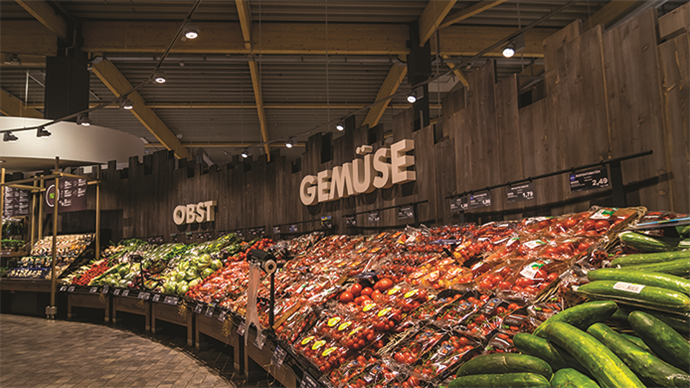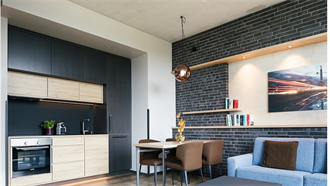The chaotic response of supermarkets towards e-commerce demand across Europe in the current crisis gives hope to landlords in the sector, according to Dublin-headquartered Greenman Investments, an investor in German food-anchored retail parks and retail warehouses.
‘Online food retailers’ technical infrastructure and physical response has not matched consumer demand to date,’ notes Johnnie Wilkinson, CEO of Greenman. ‘If online food retail sales had worked really well, this could have had a negative impact for us at a market level.’
Greenman Open’s €750 mln-strong German portfolio is significantly exposed to grocery retailing. The firm only acquires one type of asset – food-dominated retail parks, hybrid centres, neighbourhood centres and retail warehouses. But to date, this is proving overwhelmingly positive in a crisis where only select retailers are allowed to trade, Wilkinson explains.
Essential goods
‘About a month ago, Germany launched restrictions which led to non-essential retail being closed. That left food retailers, chemists, drug stores and petrol stations open,’ Wilkinson says. Around 81% of Greenman Open’s portfolio across Germany is occupied by ‘essential’ retailers, leaving its largest food-retail focused fund in a strong position during the crisis, he adds.
‘Edeka, Germany’s biggest retailer with a 30% market share, also provides about 38% of our rental income. Anecdotally, the firm has reported very high turnover at this time, with a focus on the safety of staff and keeping supply lines open. That seems to be similar to other grocery tenants. From that perspective, we are seeing virtually zero rental impact – the onus is on us to try and support them to meet increased trade.’
He adds: ‘We have a 2.5% vacancy in our portfolio at the moment, so we’ve offered this vacant space for short term storage to support their supply chains. You may have heard of McDonalds lending staff to Aldi at this time - we are trying to facilitate a similar exchange of staff at a centre by centre level across our portfolio.’
Further restrictions
Following the ‘essential’ retail decree, the government more recently published legislation leaning towards clarifying landlord and tenant relations.
‘The key item was that between April and September, landlords can’t force tenants out, or push them into insolvency for non-payment of rent during the same period, right through until some time in 2022. Retailers, on their side, can’t make use of voluntary insolvency, except in very rare cases. The latter part of the legislation blocks those instances where tenants use insolvency as a tool to negotiate lower leases,’ Wilkinson says.
‘What is quite important from a general perspective is that a lot of this legislation was used in 2009; Germany rebounded fairly quickly in 2010, so there’s an attempt to repeat the playbook.’
Tenant relations
While 81% of Greenman’s tenants are ‘essential retailers’ and thus able to operate, other tenants still have some scope to sell goods at this time, Wilkinson says.
‘There are ‘non-essential’ drugstores such as Muller, which also sells stationery and toys. They are open, but have closed-off parts of their stores and as a result, retailers have asked for rent reductions due to only partly trading. We have said that we’ll look at it, but asked them to share their turnover data. It’s important to note that even where retailers have been forced to close, across Germany, rent obligations haven’t been waived. This gives us the opportunity to be tougher with tenants where appropriate.’
The Greenman chief says he is aware that some retailers might try to exploit the situation to try and avoid paying rent at all, but that the landlord plans to fight back where it suspects balance sheets are healthy on the whole. In the case of tenants which are going to ‘really suffer’, Wilkinson says ‘we may need to look to more creative solutions’.
These include mid-market fashion and home furnishing stores, particularly those which have already been struggling in recent months and years.
Limits on lenders
Landlords may also benefit from legislation affecting the banks. ‘There is a point, yet to be tested in court, that during this period April to September, lenders are obliged to show forbearance on interest payments. Our lawyers have not able to shine a light on that yet – but it may help borrowers,’ Wilkinson notes.
At the end of 2019, Greenman had a gross value of €750 mln in its open-ended funds, €342 mln of which comprised debt, with €72 mln in cash - a LTV of 36%.
Would this crisis encourage Greenman to reduce its debt in future? Not necessarily. ‘We have back-tested against valuation declines of 30% and even non-payment scenarios, but still don’t breach loan covenants,’ Wilkinson says. ‘The properties we buy are still very popular and we don’t anticipate value declines in the short term thanks to food anchors and long leases.’
More importantly, Greenman has been able to take advantage of a cheap debt environment. 'The benefits of adding gearing to deals is better now than two years ago. We’d actually go as high as a 45% LTV.’
Further deals
‘Would we get into an offer process right now? Yes, if it was 100% food,’ Wilkinson says. ‘We have ongoing relationships with existing project developers from whom we will continue to buy. Some 30% of our deals come from developers, and we’re hopefully just about to enter into an agreement with one for five projects delivering between Q1 2021 and Q1 2022. We hope to to sign a framework agreement for this in the near term and would be interested in further framework deals with project developers.
‘We’re also close to signing a contract on a c. €90 mln deal to acquire 23 supermarkets located in a triangle between Berlin, Hannover and Halle.'
It's also business as usual for the Greenman team as they adapt dealmaking processes to 'socially distant' conditions. 'Generally, remote working is functioning well, with new investor subscriptions going ahead through online document signing software and the use of meetings via Microsoft Teams and Zoom. That is going to be a long-term gain for us, as people in the business get used to using effective pieces of technology.’
Flexiblity
However, Wilkinson underlines that the supermarket industry has proved less nimble in terms of tech upgrades. One (unnamed) French supermarket chain, which already generates 7% of revenues through e-commerce, recently found that its model of ‘picking and packing’ online orders at stores local to consumers was soon overwhelmed in the crisis, and proved notably unable to track stocks real-time, he suggests. What has been more successful is grocery retailer flexibility in terms of their real estate portfolios.
‘Edeka, which owns wholesaler Mios – and has 122 Mios markets across Germany – has been using its cash-and-carry chain as distribution centres as well. These assets tend to be much larger, have greater storage, and are strategically located on industrial estates, which makes them natural e-commerce spots for satellite distribution. Casino is doing a similar thing in France, where its hypermarkets are being used for storage and even partially converted into data-centres.’
Overall, the essential retailer story is a positive one for landlords even in this difficult time. ‘At the end of the day, there are 83 million Germans to be fed,’ Wilkinson says. ‘It does back up our business case – necessity retail survives no matter what, and food needs to be stored somewhere.’



































